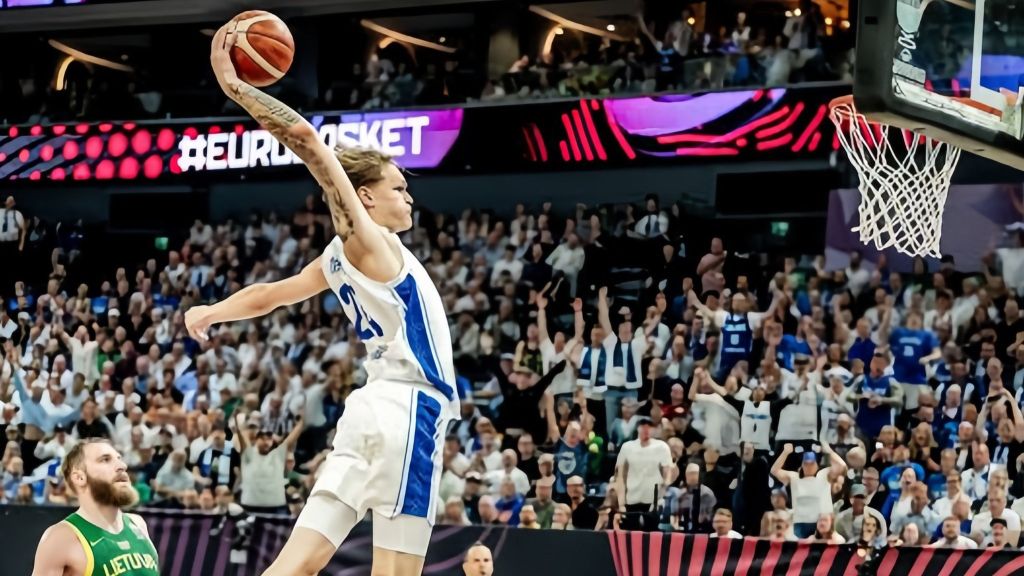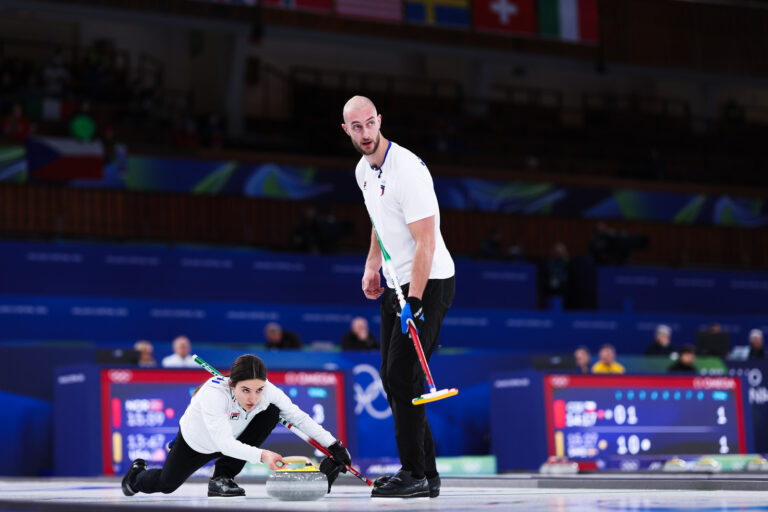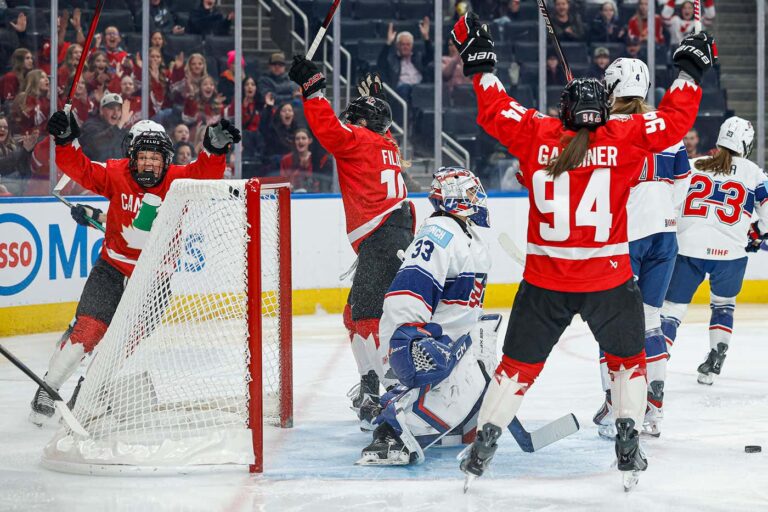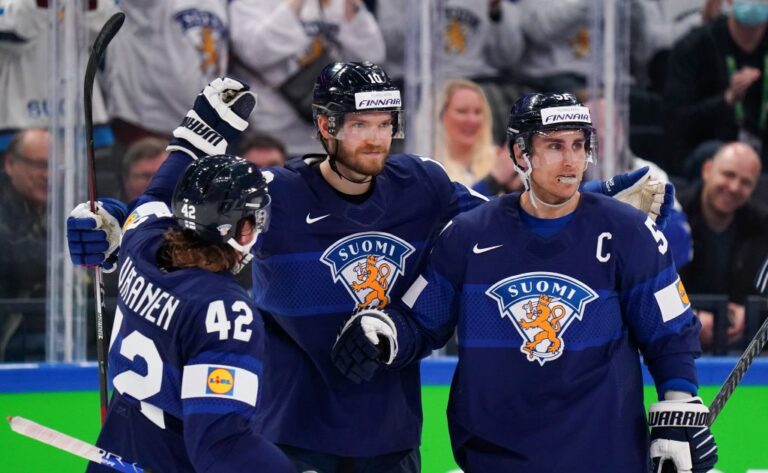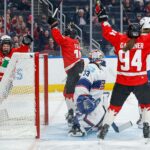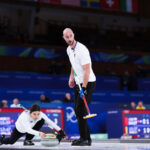EuroBasket 2025 is underway, and it’s shaping up as a thrilling tournament for basketball bettors. Co-hosted by Finland, Latvia, Poland, and Cyprus, this 24-nation competition ran from 27 August to 14 September. Europe’s top stars, from NBA MVP Nikola Jokić powering Serbia to Greek phenom Giannis Antetokounmpo, Slovenia’s Luka Dončić, and Finland’s own Lauri Markkanen, have taken the stage of the 42nd edition of EuroBasket.
The group phase delivered major drama, including defending champions Spain shockingly crashing out in the group stage. That’s the first time a reigning EuroBasket champ failed to reach knockouts since Germany did the same in 1995.
In this betting guide, ibet recaps the group stage upsets, map out the knockout bracket, and highlight how to watch every game. We’ll also dive look at ibet’s latest EuroBasket 2025 odds, betting markets and picks, from outrights and MVP futures to game lines and live angles, with special focus on Nordic contenders Finland and Sweden.
Let’s jump into the action and find the best betting value as Europe’s best battle for the title.
EuroBasket 2025 Round of 16 Recap
The first knockout weekend of EuroBasket 2025 had it all: close calls, real shocks, and two big wins.
Sweden almost beat Türkiye, but they faded late. Lithuania controlled the Baltic derby from the start, and Germany turned a close game into a rout with a huge fourth quarter.
The real betting news, though, came with Finland beating Serbia and Georgia beating France. However, the bracket was already blown open after the defending champions, Spain, crashed out in the group stage.
What Happened?
Sweden-Türkiye (85-79) was the “what if” game of the weekend. Sweden was ahead 42-37 at halftime and spent more time in front overall, but Türkiye turned the game around with a 14-0 run in the third quarter and fell behind Alperen Şengün’s late-game plays.
The lead tracker tells the story: Sweden had the lead for 23:43 of the game, while Türkiye only had it for 14:54. The favorites had the last run and possessions, with Şengün leading the way with 24 points and 16 rebounds. It’s a good idea to remember this when pricing Türkiye in the QF: they can be weak for a long time but win the math in the key window.
Two big guys moved forward with confidence. Germany came back from a 31-32 halftime deficit to Portugal by scoring 33-7 in the fourth quarter. The efficiency gap was clear (GER 47% FG, 71.4% 2PT vs POR 30% FG, 20% 3PT), and seven Germans scored 7 or more points, with Franz Wagner leading the way with 16 points.
Lithuania, on the other hand, led Latvia from start to finish (up 28-18 after Q1; led for 39:31) and controlled the quality of the shots (LTU 48% FG, 55.6% 2PT) to keep the home team from getting too far ahead. Both wins show that they have long-term strengths: Germany’s depth and late-game defense, and Lithuania’s ability to control the game and stay calm when they are ahead.
Belgrade, We Have a Problem!
Then things went wrong for the favourites. Finland beating Serbia (92-86) was a real game-changer: Serbia owned the paint (64% 2PT), but the Suomi team won the possession and perimeter battle (35.7% 3PT vs 30.6%, led for 26:05) and made the bigger shots in the fourth quarter, winning 24-20.
Meanwhile, France’s numbers were just as bad: Georgia shot 52% from the field and 55.6% from three-point range, while France shot 35% from the field and 16.7% from three-point range. Georgia led for almost 32 minutes and finished with veteran poise. Luka Dončić (Slovenia 84-77 Italy) and Giannis Antetokounmpo (Greece 84-79 Israel) both had great games, and the quarterfinal field is full of both uncertainty and form lines that bettors can take advantage of.
EuroBasket 2025 Quarterfinals Preview
Now, let’s take a look at what’s left of the EuoBasket 2025 schedule. And if you’re wondering where to watch EuroBasket 2025, we got you covered as well.
Türkiye vs Poland
- Tuesday, September 9 at 16:00 CET
The 12 Dev Adam survived Sweden 85 to 79 in a game Sweden led for longer stretches. Türkiye owned the offensive glass with 18 offensive rebounds and a 16 to 6 second-chance margin, then Alperen Şengün closed it with power plays. Poland beat Bosnia and Herzegovina 80 to 72 behind a Jordan Loyd scoring binge and steady half-court control.
Matchup edges that travel
- Offensive rebounding is Türkiye’s lever. If they create repeat possessions early, the math tilts quickly.
- Poland rely on primary shot creation. When their lead scorer settles in, they can live in the mid 80s without extreme pace.
ibet markets to consider
- Şengün rebounds over or a double double ticket, since role and volume are stable.
- Türkiye to win or handicap if the offensive rebounding edge is visible in the first quarter. Poland first half spread if Türkiye begin slowly.
- Poland leading scorer and player points ladders if ibet lists them, with Loyd as the heat check profile.
- Team totals linked to Türkiye three point variance. If the offensive rebounding dries up, Türkiye team total under. If the glass dominance shows again, team total over becomes viable.
How to watch Türkiye vs Poland
Global streaming on Courtside 1891. Türkiye on S Sport and TRT Spor. Poland on TVP Sport.
Lithuania vs Greece
- Tuesday, September 9 at 20:00 CET
Lithuania handled Latvia from the opening tip and led for almost the entire game with strong two point efficiency and composed pace control. Greece beat Israel 84 to 79 behind a Giannis Antetokounmpo masterclass that paired elite finishing with late rebounding.
Matchup edges that travel
- Greece want paint touches and free throws through Giannis. Lithuania can shrink the lane, switch size, and dare secondary Greek shooters.
- Lithuania protect leads with half-court execution and glass work, which lowers game volatility.
ibet markets to consider
- Game total under or team unders if early whistles do not supercharge free throws.
- Giannis points and free throw attempts overs if the whistle favours drives and if Lithuania are forced into rotations.
- Lithuania to qualify in bracket markets if you prefer control and depth. Greece alternative spreads if a heavy whistle appears early.
How to watch Lithuania vs Greece
Global streaming on Courtside 1891. Lithuania on TV3. Greece on ERTFLIX and Nova Sports.
Finland vs Georgia
- Wednesday, September 10 at 16:00 CET
Finland produced the weekend shock with a 92 to 86 win over Serbia. They mauled the offensive glass with 20 offensive rebounds, hit the late shots through Elias Valtonen, and rode Lauri Markkanen for star shot creation. Georgia eliminated France 80 to 70 with blistering perimeter efficiency and veteran closing.
Matchup edges that travel
- Finland offensive rebounding is repeatable and can win the possession battle even on average shooting nights.
- Georgia’s path leans on perimeter efficiency and the Toko Shengelia plus Kamar Baldwin creation tandem.
ibet markets to consider
- Markkanen points or three pointers over. If ibet lists combination markets, Finland to win with Markkanen 25 plus is a natural correlation.
- Finland team offensive rebounds or individual rebounding overs if posted.
- Georgia team three pointers over if early looks are clean, or a live under if Finland run shooters off the line.
- To advance market may be the tightest of the round. Consider a pregame Finland to qualify position with a live hedge if Georgia heat up from deep.
How to watch Finland vs Georgia
Global streaming on Courtside 1891. Finland on Nelonen and Ruutu. Georgia on Georgian Public Broadcaster 1TV.
Germany vs Slovenia
- Wednesday, September 10 at 20:00 CET
Germany beat Portugal 85 to 58 after a tight first half and exploded with a 33 to 7 fourth quarter. The efficiency gap was decisive with Germany strong at the rim and Portugal cold from the perimeter. Slovenia beat Italy 84 to 77 with a 29 to 11 opening quarter and a Luka Dončić 42 point masterpiece.
Matchup edges that travel
- Germany can throw waves of size and length at a heliocentric offense. If they flatten Slovenia’s secondary creators, they can accept heavy Luka counting stats.
- Slovenia often start hot. If Germany begin slowly, live entries become attractive.
ibet markets to consider
- Germany second half handicap or fourth quarter lines in live markets based on their demonstrated late gear. Pair with Slovenia first quarter if you expect the Luka surge.
- Luka points over is always live although assists over or turnovers over may be better depending on traps and blitzes. This correlates with Germany to qualify if you believe they will concede Luka scoring while removing everyone else.
- Totals logic follows pace control. If Germany control tempo, look toward game under or Slovenia team total under. If Slovenia’s shooters join Luka, a live over becomes preferable.
How to watch Germany vs Slovenia
Global streaming on Courtside 1891. Germany on MagentaSport and RTL. Slovenia on Šport TV and EON.
EuroBasket 2025 Group Stage Recap
EuroBasket 2025’s group phase had its fair share of surprises. Each team played five games in round-robin groups (A–D), with the top four from each group advancing. The biggest shock was Spain’s early exit: the 2022 champions went 2-3 in Group C and failed to advance for the first time since 1977. Spain’s fate was sealed in a dramatic 86–90 loss to Greece, where Giannis Antetokounmpo and company eliminated the champs. That loss also meant Georgia pipped Spain for the last spot from Group C, as Georgia had beaten Spain head-to-head.
Several underdog upsets took place during the group stage. Israel stunned France 82-69 on opening weekend, handing the French their only loss and proving no favourite is safe. Bosnia and Herzegovina likewise shocked Group C winners Greece 80–77 in an early matchup.
Co-host Poland got a scare from Belgium but advanced with a 3–2 record after a clutch 70–69 win over the Belgians. Meanwhile, Turkey emerged as the only undefeated team besides Germany. The Turks went 5–0 in Group A, capped by a statement 95–90 victory over Serbia led by Houston Rockets center Alperen Şengün (28 pts, 13 reb, 8 ast). Germany dominated Group B at 5–0, boasting the tournament’s highest scoring offense (105.8 points per game) behind NBA talents like Dennis Schröder and Franz Wagner.
The Nordic teams had mixed fortunes. Co-host Finland impressed the home fans in Tampere, finishing 3–2 in Group B to advance. Finnish star Lauri Markkanen put on a show as he averaged 25.4 points (3rd in the tournament), including a 43-point explosion against Great Britain. Finland’s only group losses came to powerhouses Germany and Lithuania.
Meanwhile, Sweden, also in Group B, surprised everyone by clinching the 4th spot despite a 1–4 record. The Swedes benefited from a three-way tiebreak and a crucial win over Great Britain – marking Sweden’s first trip to the EuroBasket knockouts since 2013. Rising star Pelle Larsson led Sweden with 19.8 PPG in group play.
On the other hand, Iceland (0–5 in Group D) struggled against tough competition and did not advance.
Round of 16 Preview – Matchups and Bracket Outlook
With group play complete, the Round of 16 bracket was set. Below are the eight knockout matchups:
- Turkey (1st A) vs Sweden (4th B): A true David vs Goliath game. Unbeaten Turkey, led by Alperen Şengün’s all-around brilliance, are heavy favourites against a Sweden side delighted just to be here. Still, Sweden’s momentum and Larsson’s scoring could help them cover a large point spread if they keep it close early.
- Germany (1st B) vs Portugal (4th A): Germany has been an offensive juggernaut (over 105 PPG) and should handle Portugal comfortably. Expect Germany’s depth and size to dictate the game. A double-digit win margin is likely, though Portugal’s gritty defense could make unders on total points a consideration.
- Lithuania (2nd B) vs Latvia (3rd A): A Baltic derby between neighboring rivals. Co-host Latvia will have a partisan crowd in Riga on their side, but Lithuania’s tournament pedigree gives them a slight edge. This could be a tight battle and backing Latvia plus the points at ibet might offer value with their home-court energy and three-point shooting.
- Serbia (2nd A) vs Finland (3rd B): A marquee showdown featuring Nikola Jokić vs Lauri Markkanen. Serbia are tournament co-favourites and have more weapons, but Finland’s hopes rest on Markkanen’s hot hand. If Markkanen gets cooking, Finland can keep it close. Consider the over on his points prop and Finland against a big spread. Still, Serbia’s firepower makes them likely to advance.
- Poland (2nd D) vs Bosnia and Herzegovina (3rd C): An intriguing matchup of dark horses. Co-host Poland will lean on a balanced attack, while Bosnia rides the confidence of beating Greece earlier. This feels like a coin-flip game, so taking Bosnia plus the points or even the underdog moneyline could be a savvy pick at ibet, specially if their star Dzanan Musa heats up.
- France (1st D) vs Georgia (4th C): France rebounded from an early upset to top Group D, and their NBA talent (like Rudy Gobert and Nicolas Batum) should overwhelm Georgia. Georgia’s main hope is a big game from Tornike Shengelia and capitalizing if France starts slow. Still, France’s defense and depth make the under attractive, and a French win by a comfortable margin is expected.
- Italy (2nd C) vs Slovenia (3rd D): A must-watch clash between teamwork vs superstar. Italy’s balanced squad faces Slovenia led by Luka Dončić, who is capable of single-handedly winning a game. Slovenia finished only 3–2, but Dončić’s triple-double potential means no lead is safe for Italy. Consider Dončić’s over in assists, as Italy may force the ball out of his hands. Italy’s edge in depth makes this nearly even so expect a thriller.
- Greece (1st C) vs Israel (4th D): Greece enters on a high after eliminating Spain, but they can’t overlook Israel, who have proven giant-killers (ask France!). If Giannis Antetokounmpo is fully fit, Greece’s physicality should prevail. However, Israel’s Deni Avdija has been stellar, averaging over 20 points. Watch for a potentially closer game than odds suggest if Greece’s shooting falters… maybe an opportunity to grab Israel on the spread live if they hang around by halftime.
The winners will advance into the quarter-finals, following a set bracket. For instance, the Turkey/Sweden winner will meet the Poland/Bosnia winner, and so on. All roads lead to the championship game on 14 September in Riga, Latvia.
Bettors should keep bracket dynamics in mind given that ibet offers “to reach the final” or “to win quarter/semifinal” markets where picking a side of the bracket (e.g. Germany’s path vs France’s path) can be profitable if you spot an easier route.
How to Watch EuroBasket 2025
Watching the action live is essential for informed betting and, luckily, there are multiple ways to tune in:
Official Stream: Courtside 1891 is FIBA’s official streaming service, showing every EuroBasket 2025 game live or on-demand (some games even free with registration in certain regions). In the UK, where no TV network picked up the rights, Courtside 1891 is the go-to option.
TV Broadcasters: Most participating countries have a local broadcaster airing games. Here’s a quick country-by-country guide for key regions:
| Country | Broadcast Partner |
| Finland | Nelonen (TV) / Ruutu streaming |
| Sweden | SVT1 (TV) |
| Iceland | RÚV (TV) |
| United Kingdom | No local TV – use Courtside 1891 (FIBA live stream) |
| France | TMC (free TV) / beIN Sports |
| Germany | Magenta Sport (stream) / RTL (TV) |
| Spain | Teledeporte (TV) |
| Italy | DAZN / RAI Sport / Sky Italia |
| Turkey | S Sport / TRT Spor (TV) |
By knowing where to watch, you can follow games in real time and even engage in live betting on ibet as the action unfolds. Make sure to check local schedules as not all broadcasters show every game, especially neutral ones, so the FIBA stream is often the best option.
EuroBasket 2025 Betting Markets at ibet
ibet offers a full suite of markets on EuroBasket 2025. Whether you want to back an outright winner or bet on individual game stats, ibet has you covered. Here we break down the key betting markets available:
Tournament Outrights & Futures
For long-term punters, ibet’s tournament markets let you wager on how the entire EuroBasket will play out. Popular options include:
- Outright Champion: Predict which team will lift the trophy. Serbia and Germany opened as top favorites (around 3.20 odds each pre-knockout), with Turkey not far behind. These odds shift as teams progress; for example, Spain’s early elimination has made the field more open. If you fancy a dark horse like Latvia or Italy, the potential pay-outs are high due to their longer odds.
- To Reach Final / Medal: Bet on a team to at least make the final, or to win any medal (top 3). If you believe a team has a favourable bracket but might fall just short of gold, these markets offer a safer alternative to outright winner bets.
- Stage of Elimination: Wager on when a team will be knocked out (Quarter-finals, Semis, Runners-up, etc.). For instance, risk-averse bettors might have taken Spain “to be eliminated in Group Stage” at a hefty price (which indeed happened).
- Tournament MVP: EuroBasket’s MVP award is a hot market, often correlating with the championship team’s star. At ibet, Nikola Jokić opened as a leading MVP candidate, closely followed by Turkey’s Alperen Şengün and Germany’s Franz Wagner. This market offers value if you can predict which superstar will carry his team furthest. Just remember the MVP almost always comes from a medal-winning team.
- Top Scorer: A fun futures bet on which player will score the most total points in the tournament. Slovenia’s Luka Dončić was the favorite in this category given his high usage, but Finland’s Lauri Markkanen and others are in contention. Consider not just scoring averages but how many games a player will play given a finalist has more opportunities to rack up points.
Game-by-Game Betting Markets
For each game, ibet provides a comprehensive array of betting lines:
- Moneyline (Match Winner): The simplest bet. Just pick which team will win the game. Given the talent disparities, moneyline odds for powerhouses like France or Serbia can be very short in early rounds. Upsets do happen (e.g. Israel over France), so savvy bettors might take a stab at a big underdog or use moneyline favorites in parlays for better value.
- Point Spread (Handicap): Level the playing field by giving the underdog a points head-start. For example, if Sweden are +15.5 underdogs against Turkey, a bet on Sweden pays if Sweden wins or loses by 15 points or fewer. Spreads are popular in uneven matchups. If you expect a closer game than the odds, backing the underdog spread is wise. Conversely, if you foresee a blowout, you might lay the points with the favourite.
- Total Points (Over/Under): Bet on the combined points scored by both teams. FIBA games are 40 minutes (not 48 like the NBA), so totals are generally lower, often in the 150s or 160s for competitive games. Before betting, consider team play styles: a defensive battle (France vs Greece) might go Under, whereas two fast-paced teams (e.g. Germany vs Slovenia) could shoot Over the total.
- Quarter & Half Bets: Wager on results per quarter or half. You can bet which team will win a specific quarter or half, or the point totals in those periods. These markets are great for targeting slow-starting or fast-starting teams. For instance, if a favourite tends to start sluggishly, you might bet the underdog +points in the 1st quarter.
- Player Props: ibet offers props on individual player stats, such as points, rebounds, or assists. In a tournament with NBA stars, these can be enticing.For example, taking Markkanen over 24.5 points, or Jokić to get a double-double. When betting props, factor in matchup and rotation: a star player might play fewer minutes in a blowout or if facing foul trouble (only 5 fouls allowed in FIBA, not 6). Matchups matter too as a team with weak interior defense might allow an opposing center to exceed his points or rebounds line.
- Specials: Depending on the game, ibet may have special bets like “Team to score 20+ in every quarter” or “Player X to score 10+ points and Team Y to win”. Keep an eye on these for creative angles, especially if you have a read on a particular trend (for example, Germany scoring quickly in first quarters, or Greece relying on three-pointers).
Betting Tips for FIBA Format
Betting on international basketball requires some strategic adjustments. Here are key tips that apply to EuroBasket games (and how they differ from the NBA):
- 40-Minute Games: With 8 fewer minutes than an NBA game, there are fewer possessions and often lower scores. This means point spreads and totals at ibet are adjusted downward. Underdogs have a slightly better chance to shock favourites in a shorter game as less time gives favourites less room to correct a slow start. Keep this in mind when considering big spreads or heavy favourites on the moneyline.
- Different Rules: FIBA rules can impact betting outcomes. For example, there is no defensive three-second violation, so teams can pack the paint in a zone defense. This can lead to lower shooting percentages inside and sometimes lower-scoring games if teams don’t shoot well from outside. Also, FIBA’s goaltending rule allows players to touch the ball once it hits the rim (unlike the NBA). Savvy bettors note that this can wipe away borderline basket interference calls, possibly taking away a few points that might have counted in NBA play.
- Fouls and Officiating: Players foul out on 5 personals in FIBA. If a star picks up early fouls, it can swing a game’s momentum (and the point total). When betting live, watch for key players getting into foul trouble it might be a cue to bet the opposing side or the under. Officiating tends to allow a bit more physical play and travels are called more strictly than in the NBA, which can affect scoring runs and player performance.
- Pace and Style: European games often have more deliberate half-court offense and fewer isolation plays. Countries like France or Spain pride themselves on team defense, whereas others like Slovenia rely on star-centric offense. Research each team’s style as a matchup of two defensive teams is a good under bet, while two uptempo squads (e.g., Germany and Israel, who both averaged over 90 PPG in groups) might be prime for overs.
- Tournament Scheduling: EuroBasket has compact scheduling with games almost every other day and travel between host cities. Fatigue can be a factor. A veteran team playing on short rest might struggle in the second half (look at betting against them in live spreads or 4Q lines). Also, teams that clinched advancement early might have rested players in the final group game, so don’t read too much into one surprising result if the context was unique.
By understanding these nuances, you can make more informed bets on ibet’s platform and exploit any mispriced lines.
EuroBasket 2025 Live Betting Opportunities
EuroBasket 2025 offers plenty of in-play betting opportunities on ibet, thanks to the tournament’s swings and momentum shifts. Here are some angles to consider for live betting:
- Comebacks and Runs: International basketball is full of game swings. In Spain’s elimination game, Greece jumped to a 16-point lead, only for Spain to storm back and even briefly take the lead. If a favourite falls behind early, live bettors can grab them at better odds or a reduced spread. Conversely, if an underdog races out hot (perhaps hitting a flurry of threes), it might be a chance to live bet Under the inflated total, anticipating regression.
- Star Player Impact: Keep an eye on when teams rest their stars. For example, if Jokić goes to the bench for Serbia and Finland is hanging around, a live bet on Finland plus the points in that stretch could pay off. Similarly, if a key player looks gassed or picks up a 4th foul in the 3rd quarter, consider betting the other side or the under on that player’s live points.
- Clutch Scenarios: In knockout games, expect late-game fouling and pressure situations. If a game is within, say, 6–8 points with a minute left, underdogs often foul to extend the game hence potentially pushing the total points over if free throws and last-second baskets add up. Being aware of this can make for profitable late-game over bets at ibet’s live odds, which might underestimate how much scoring can happen in the final minute of a close elimination game.
- Hot Hand vs. Adjustment: Sometimes a lesser-known player catches fire (e.g., a role player hits 4 threes in the first half). Live markets might be slow to adjust individual prop lines or team totals. However, international coaches adjust quickly and they might lock down that player in the second half. Betting the under on his live points total or the opponent to cover a small second-half spread could be wise, assuming the hot shooting cools off.
- Home Crowd Momentum: With Latvia, Finland, Poland, and Cyprus hosting groups, crowd energy has been a factor. In Riga, if Latvia starts building a lead, the crowd can become a frenzy which is a great time to ride the momentum with a live bet on Latvia to extend the lead. On the flip side, a young team might get rattled by hostile fans when trailing; consider betting on the home team’s surge or the opponent’s scoring drought (live under on their team total) in such moments.
ibet’s live betting interface will update odds in real time, allowing you to seize these opportunities. Just remember to stay disciplined. Live lines move fast, so identify your target entry points beforehand (e.g., “I’ll take Team X if they fall to +10 or more”).
EuroBasket 2025 Nordic Focus – Betting Angles on Finland & Sweden
With Nordic teams making betting news headlines, let’s zero in on Finland and Sweden from a betting perspective:
- Finland (Susijengi): Finland’s strength is undoubtedly Lauri Markkanen. The Utah Jazz star is averaging 25+ points and has had some huge games. Finland’s offense runs through him, which presents betting opportunities. Player Props: Markkanen’s points line will be high, but he often delivers. Against weaker defenses, backing his Points Over has been a winning move (he dropped 28 on Sweden and 43 on GB in group play). However, watch out when Finland faces elite interior defenses (e.g., Serbia); he might get double-teamed, making his assist over or a prop on another Finnish player (like sharpshooter Sasu Salin) more attractive. Spread Bets: Finland tends to play up or down to competition. They pushed Lithuania to the brink in a 3-point loss, yet were blown out by Germany. In knockouts, consider Finland as underdog value given their three-point shooting and Markkanen’s star power mean they can hang with top teams if shots fall. If they’re getting a hefty +12 or more, that could be worth a look on ibet. Conversely, as a favourite (if they were to play a team like Georgia), be cautious laying too many points as their defense can be inconsistent.
- Sweden: The Swedes have already exceeded expectations by reaching the Round of 16. This can make them a dangerous underdog given they’re playing with house money. Underdog Props: Look at players like Pelle Larsson, a breakout star averaging ~20 points. Books might undervalue him in player props due to lack of name recognition; a points or rebounds over for Larsson could have value, especially in a showcase game against Turkey. Team Totals: Sweden’s offense isn’t high-octane, but they’ve shown they can score in spurts (they put up 78 on a tough Lithuania defense). If they get a matchup where they’ll push pace (perhaps if trailing a fast team), a live over on Sweden’s team total might hit. Heart vs. talent: Keep in mind, against elite squads, Sweden’s lack of NBA-level size could hurt. In a game like vs Turkey, consider betting Turkey’s big men props (rebounds or points in the paint). Turkey’s advantage inside might be pronounced. Overall, Sweden’s best betting value might be in first-half spreads; as a heavy dog they could hang around early with adrenaline, even if they fade later
Both Finland and Sweden also provide an emotional hedge angle for Nordic fans. If you’re cheering for them, you can still win money on ibet even if they fall short, by betting smartly on props or spreads as outlined. And if they perform, your patriotic punt pays off twice!
EuroBasket vs NBA Rules – Betting Impact
Many punters used to betting NBA games need to adjust for international rules and style. Here are the key NBA vs FIBA differences and how they affect bets:
- Game Length: EuroBasket games are 40 minutes (4 quarters of 10) vs 48 minutes (4×12) in the NBA. Fewer minutes naturally mean fewer points so you’ll notice totals on ibet are much lower than an NBA game. Don’t be alarmed seeing totals ~155; that can be a fairly average-scoring FIBA game. Also, spreads might be tighter for comparable team skill gaps, since a dominant team has 8 fewer minutes to pull away. A 15-point win in FIBA is roughly equivalent to 18+ in the NBA in terms of dominance.
- Fouls: Players foul out at 5 personals (not 6). This makes foul trouble a bigger deal. As a bettor, be wary of betting heavy on a team reliant on one star. An early whistle and the game plan can unravel. It also means coaches rotate more to protect players, which can keep games closer if stars sit. Additionally, team fouls reset each quarter (5 team fouls = bonus free throws, similar to NBA), but halves are shorter, so sometimes fewer free throws overall. This can contribute to slightly lower scoring than an NBA game with many late-quarter free throws. If referees call a tight game, early foul trouble can also push a total over due to free throws, so watch the ref style if known.
- Three-Point Line & Shooting: The FIBA three-point line is closer (6.75m vs NBA’s 7.24m top of arc). This usually means slightly higher 3PT percentages, which can increase scoring for teams that shoot well. Teams like Italy or Latvia that live by the three might have an edge. However, the shorter line also means defenses cover the arc more tightly (it’s easier to shoot, but also easier to contest given the shorter distance). Look at a team’s 3PT rate specially if they rely heavily on threes, their totals might be boom-or-bust based on a hot or cold shooting night.
- No Defensive 3-Second: In FIBA, there’s no rule preventing defenders from camping in the lane. Teams can and do play zone defenses with big men staying near the rim. This can clog the paint and reduce easy baskets. For bettors, this means games can become jump-shot heavy. If you have a team that’s not a great shooting team facing a zone-heavy opponent, consider the Under or betting their team total under. Also, prop-wise, a player known for driving (say, Giannis) might see lower scoring against a packed paint, whereas a good shooter might thrive.
- Overtime and Misc: Overtime is 5 minutes in FIBA (same as NBA), and bets generally count OT unless specified. One quirk: the ball and rim interference rule as once the ball hits the rim, any player can touch it (knock it away or tip it in). This could take some nearly-made baskets off the board (a defending player swats it off the cylinder) or allow athletic players to tip-slam in misses. It’s a minor factor, but worth knowing. Perhaps an extra reason to lean Under in games with dominant shot-blockers who can now legally remove borderline shots.
- Physicality and Officiating: FIBA referees allow a bit more contact on ball handlers, and traveling is called more often on moves NBA players get away with. This can lead to a lower scoring flow, as some NBA stars might turn the ball over on moves they usually score on. It can also benefit defensive-minded teams. When two defensive-minded or physical teams play, expect a grind and points come at a premium, making unders and plus points on the underdog appealing.
In summary, the differences in rules tend to depress scoring and widen variance slightly, which savvy bettors can exploit. Always contextualize your bets with these rule changes given something as simple as a team built around one shot-blocking center can thrive more in FIBA (where he can stay in the lane) than in the NBA.
EuroBasket 2025 Groups and Knockout Standings
After the group stage, here’s how each group finished and which teams moved on to the knockouts:
Group A Standings:
| Team | W–L | Points (PF/PA) | Status |
| Turkey | 5–0 | 91.8 PF / 71.8 PA | Advanced (1st) |
| Serbia | 4–1 | 86.8 PF / 73.6 PA | Advanced (2nd) |
| Latvia | 3–2 | 82.4 PF / 76.8 PA | Advanced (3rd) |
| Portugal | 2–3 | 63.0 PF / 73.6 PA | Advanced (4th) |
| Estonia | 1–4 | 70.4 PF / 79.4 PA | Eliminated |
| Czechia | 0–5 | 67.6 PF / 86.8 PA | Eliminated |
Group B Standings:
| Team | W–L | Points (PF/PA) | Status |
| Germany | 5–0 | 105.8 PF / 73.0 PA | Advanced (1st) |
| Lithuania | 4–1 | 86.2 PF / 78.6 PA | Advanced (2nd) |
| Finland | 3–2 | 85.2 PF / 81.2 PA | Advanced (3rd) |
| Sweden | 1–4 | 80.6 PF / 83.6 PA | Advanced (4th)¹ |
| Montenegro | 1–4 | 75.6 PF / 91.0 PA | Eliminated |
| Great Britain | 1–4 | 70.8 PF / 96.8 PA | Eliminated |
1: Sweden advanced via tiebreak in a three-way tie at 1–4.
Group C Standings:
| Team | W–L | Points (PF/PA) | Status |
| Greece | 4–1 | 86.4 PF / 70.8 PA | Advanced (1st) |
| Italy | 4–1 | 79.2 PF / 66.6 PA | Advanced (2nd) |
| Bosnia & Herzegovina | 3–2 | 80.2 PF / 80.2 PA | Advanced (3rd) |
| Georgia | 2–3 | 73.4 PF / 77.2 PA | Advanced (4th) |
| Spain | 2–3 | 79.4 PF / 70.8 PA | Eliminated |
| Cyprus | 0–5 | 59.0 PF / 92.0 PA | Eliminated |
Group D Standings:
| Team | W–L | Points (PF/PA) | Status |
| France | 4–1 | 92.2 PF / 78.2 PA | Advanced (1st) |
| Poland | 3–2 | 80.0 PF / 77.4 PA | Advanced (2nd) |
| Slovenia | 3–2 | 83.4 PF / 80.2 PA | Advanced (3rd) |
| Israel | 3–2 | 93.8 PF / 90.4 PA | Advanced (4th) |
| Belgium | 2–3 | 72.6 PF / 80.6 PA | Eliminated |
| Iceland | 0–5 | 72.6 PF / 87.8 PA | Eliminated |
Teams in bold advanced to the Round of 16. From here, the knockout stage is single-elimination: Round of 16 (Sept 6–7) to Quarterfinals (Sept 9–10), Semifinals (Sept 12), and the Medal Games (Third-Place and Final on Sept 14). Check the Round of 16 Preview section above for the specific bracket matchups.
Notably, Spain’s absence in the knockout bracket is historic as it’s the first time since 1995 that a defending champion failed to escape the group stage. Their early exit opens the door for a new champion in 2025.
EuroBasket History – Medalists 1935 to 2022
EuroBasket has a rich history dating back to 1935. Below is a complete list of gold, silver, and bronze medalists for every tournament up to 2022:
The Soviet Union (historical team) holds the most titles with 14 golds, while Yugoslavia (including successes of its successor states like Serbia) also dominated in the 1970s–1990s. In recent years, we’ve seen more parity. Spain has been the modern powerhouse (four titles since 2009, including 2022), but countries like Slovenia (2017) and France (2013) have also topped the podium. EuroBasket 2025 will crown a new champion; will it be a traditional power or a first-time winner?
| Year | Gold | Silver | Bronze |
| 1935 | Latvia | Spain | Czechoslovakia |
| 1937 | Lithuania | Italy | France |
| 1939 | Lithuania | Latvia | Poland |
| 1941 | — (No tournament; WWII) | — | — |
| 1946 | Czechoslovakia | Italy | Hungary |
| 1947 | Soviet Union | Czechoslovakia | Egypt |
| 1949 | Egypt | France | Greece |
| 1951 | Soviet Union | Czechoslovakia | France |
| 1953 | Soviet Union | Hungary | France |
| 1955 | Hungary | Czechoslovakia | Soviet Union |
| 1957 | Soviet Union | Bulgaria | Czechoslovakia |
| 1959 | Soviet Union | Czechoslovakia | France |
| 1961 | Soviet Union | Yugoslavia | Bulgaria |
| 1963 | Soviet Union | Poland | Yugoslavia |
| 1965 | Soviet Union | Yugoslavia | Poland |
| 1967 | Soviet Union | Czechoslovakia | Poland |
| 1969 | Soviet Union | Yugoslavia | Czechoslovakia |
| 1971 | Soviet Union | Yugoslavia | Italy |
| 1973 | Yugoslavia | Spain | Soviet Union |
| 1975 | Yugoslavia | Soviet Union | Italy |
| 1977 | Yugoslavia | Soviet Union | Czechoslovakia |
| 1979 | Soviet Union | Israel | Yugoslavia |
| 1981 | Soviet Union | Yugoslavia | Czechoslovakia |
| 1983 | Italy | Spain | Soviet Union |
| 1985 | Soviet Union | Czechoslovakia | Italy |
| 1987 | Greece | Soviet Union | Yugoslavia |
| 1989 | Yugoslavia | Greece | Soviet Union |
| 1991 | Yugoslavia | Italy | Spain |
| 1993 | Germany | Russia | Croatia |
| 1995 | Yugoslavia | Lithuania | Croatia |
| 1997 | Yugoslavia | Italy | Russia |
| 1999 | Italy | Spain | Yugoslavia |
| 2001 | Yugoslavia | Turkey | Spain |
| 2003 | Lithuania | Spain | Italy |
| 2005 | Greece | Germany | France |
| 2007 | Russia | Spain | Lithuania |
| 2009 | Spain | Serbia | Greece |
| 2011 | Spain | France | Russia |
| 2013 | France | Lithuania | Spain |
| 2015 | Spain | Lithuania | France |
| 2017 | Slovenia | Serbia | Spain |
| 2022 | Spain | France | Germany |
EuroBasket 2025 FAQ: Betting & Viewing
Where to watch EuroBasket 2025 in the UK?
Fans in the UK can watch EuroBasket 2025 games through FIBA’s Courtside 1891 streaming service. There is no UK terrestrial broadcaster for the tournament, but Courtside 1891 offers live streams of all games (with three Great Britain games made free to stream as a special offer). Simply register on the platform, and you can purchase a EuroBasket pass (around £14.99) for full access or watch select games for free.
When is the EuroBasket 2025 final?
The EuroBasket 2025 final is scheduled for Sunday, 14 September 2025. It will be played at Arena Riga in Latvia, one of the host nations, with tip-off likely in the evening local time. The bronze medal game will precede the final on the same day.
Who are the favourites to win EuroBasket 2025?
According to ibet’s latest odds, Serbia and Germany are viewed as co-favourites to win the title, thanks to their star-studded rosters and dominant group stage showings. Serbia, led by Nikola Jokić, and Germany, featuring NBA talent like Franz Wagner, have odds in the range of 3.0–3.5, indicating a tight race. Other contenders include Turkey (after a 5–0 group run) and France, while defending champ Spain’s early exit has eliminated one pre-tournament favourite. Of course, knockout basketball can produce surprises as a dark horse like Slovenia or Italy could upset the odds.
Where is EuroBasket 2025 being held?
EuroBasket 2025 is being co-hosted by four countries: Finland, Latvia, Poland, and Cyprus. The group stage was split among these hosts (each country hosted one group). The knockout phase is in Riga, Latvia – which will host the Round of 16 onwards, including the final. This multi-host format is designed to spread basketball fever across Europe and has brought the action to Nordic fans in Finland as well as the Baltics, Central Europe, and the Mediterranean.
How often is the EuroBasket tournament?
EuroBasket is typically held every four years. The last edition was in 2022, and prior to that 2017, as FIBA transitioned from a two-year cycle to a four-year cycle (aligning with other major tournaments). EuroBasket 2025 is the 42nd edition of the championship. Occasionally, scheduling has shifted (for instance, EuroBasket 2021 was moved to 2022 due to the Olympics). But moving forward, the tournament is expected every four years, in between World Cup and Olympic cycles.
What betting markets are available for EuroBasket 2025 on ibet?
ibet offers a comprehensive range of markets for EuroBasket. You can bet on outrights (tournament winner, reach final, medal, group winners), individual awards like tournament MVP or top scorer, and stage of elimination for each team. For individual games, markets include moneyline (winner), point spread, total points (over/under), quarters/halves betting, and a variety of player props (points, rebounds, assists for key players). ibet also features in-play live betting, so you can wager on games as they happen with updated odds. All odds are presented in decimal format for UK/EU bettors, and you’ll find competitive prices on all these markets.
All odds displayed on this page were correct at the time of writing and may have moved since the content was published. Betting markets shift constantly based on action and betting news. For the latest odds and current lines, visit the ibet Sportsbook.
